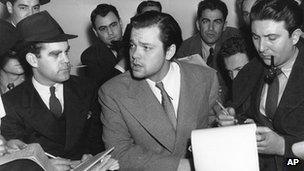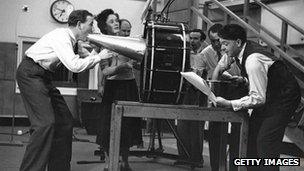The Halloween myth of the War of the Worlds panic
- Published
- comments

Orson Welles would later go on to direct Citizen Kane
Mass panic and hysteria swept the United States on the eve of Halloween in 1938, when an all-too-realistic radio dramatisation of The War of the Worlds sent untold thousands of people into the streets or heading for the hills.
The radio show was so terrifying in its accounts of invading Martians wielding deadly heat-rays that it is remembered like no other radio programme.
Or, more accurately, it is misremembered like no other radio programme.
Radio unreality
The panic and terror so routinely associated with The War of the Worlds dramatisation did not come close to a nationwide dimension that night 73 years ago.
Sure, some Americans were frightened or disturbed by what they heard. But most listeners, overwhelmingly, were not. They recognised it for what it was - a clever and entertaining radio play.
The War of the Worlds dramatisation was the inspiration of Orson Welles, director and star of the Mercury Theatre on the Air, an hour-long programme that aired on Sunday evenings on CBS Radio.
Welles was 23 years old, a prodigy destined for lasting fame as director and star of the 1941 motion picture, Citizen Kane.
His adaptation of The War of the Worlds, a science fiction thriller written by HG Wells and published in 1898, was little short of brilliant.

Further radio dramatisations of War of the Worlds spread, including this British production in 1952
What made the show so compelling was the use of simulated on-the-scene radio reports telling of the first landing of Martian invaders near Princeton, New Jersey, and their swift and deadly advance to New York City.
American audiences had become accustomed to news reports interrupting radio programmes. They had heard them often during the war scare in Europe in late summer and early autumn of 1938.
Welles played on this familiarity to stunning effect. In doing so, he created a delicious and tenacious media myth.
Newspaper headlines across America told of the terror that Welles' show supposedly created.
"Radio Listeners in Panic, Taking War Drama as Fact," declared the New York Times. "Radio Fake Scares Nation," cried the Chicago Herald and Examiner. "US Terrorized By Radio's 'Men From Mars,'" said the San Francisco Chronicle.
Exaggerated effect
Yet we know from several sources that the reports of thousands of panic-stricken Americans were wildly exaggerated.
Hadley Cantril, a Princeton University psychologist, estimated that six million people listened to The War of the Worlds dramatisation. Of that number, perhaps 1.2 million listeners were "frightened" or "disturbed" by what they heard, Mr Cantril figured.
"Frightened" and "disturbed," of course, are hardly synonymous with "panic-stricken." Overall, Mr Cantril's data signal that most listeners, by far, were not upset by the show.
Close reading of contemporaneous newspaper reports also reveals the fright that night was highly exaggerated.
Newspapers presented sweeping claims about thousands or even millions of panic-stricken Americans, but offered little supporting documentation.
Most newspapers printed dispatches sent by wire services such as the Associated Press, which extrapolated widespread fear from small numbers of scattered, anecdotal accounts.
Newspapers, moreover, reported no deaths or serious injuries related to The War of the Worlds broadcast: had panic and hysteria seized America that night, the mayhem surely would have caused many deaths and injuries.
For newspapers, the so-called "panic broadcast" brought newspapers an exceptional opportunity to censure radio, a still-new medium that was becoming a serious competitor in providing news and advertising.
Newspaper leader columns in the days immediately after the broadcast helped deepen the impression that Welles' programme had sown hysteria.
"Radio is new but it has adult responsibilities," chided the New York Times. "It has not mastered itself or the material it uses."
Despite its wobbly basis, the myth of mass panic remains steadfastly attached to The War of the Worlds programme. It is part of the lore of Orson Welles, the bad-boy genius who did his best work before he turned 30.
And it's a tale just too delectable not to be true.
W Joseph Campbell is a professor at American University in Washington, DC. He wrote about the myth of The War of the Worlds programme in his latest book, Getting It Wrong, external. He often writes about media myths at his blog, Media Myth Alert, external.
- Published14 August 2011